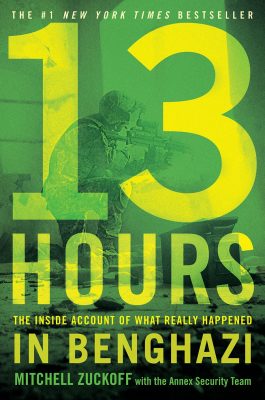
As this year’s Family and Friends Weekend unfolded over the weekend, approximately 120 Boston University students and their loved ones listened to Mitchell Zuckoff, a journalism professor at the College of Communication, to talk about his experience writing his bestselling book turned movie “13 Hours: The Inside Account of What Really Happened In Benghazi.”
Zuckoff told the crowd Saturday morning that it all started when he received a phone call in June, 2013, when a source told him that the five CIA operators who had fought together in Benghazi wanted him to write a book about it.
However, because journalists were being accused of falsity regarding activity in Benghazi at the time, the decision was not an easy one for Zuckoff, he recalled.
“The truth is that I hesitated,” Zuckoff said. “The simple truth was that Benghazi was a place where good careers went to die.”
Zuckoff said despite pressure that suggested he not take the story, including his publisher who threatened to end his contract if the book damages his credibility, he decided to write the book in the end because, first and foremost, he is a journalist.
“Being a journalist, believing in journalism, teaching the next generation of journalists and being a part of that process, it was, ‘If not me, then who?’” Zuckoff said. “How could I let this pass through my hands and not tell an important story as well as I possibly could?”
Sitting in a room on the second floor of the George Sherman Union, the audience listened intently to Zuckoff — from time to time, they burst out laughing, breaking the silence in the room.
“That same editor who had threatened my career was suddenly sending me fruit baskets,” Zuckoff said, causing the audience to chuckle.
As he discussed the writing process, Zuckoff said the most memorable moment for him was a heartfelt conversation between two of the CIA operators when they realized they were in a suicide mission.
“This book, despite what everybody else says about what Benghazi is, it’s about brotherhood,” Zuckoff said. “Once I had that in my mind, I knew where to start.”
After the discussion, Zuckoff said the techniques he used while writing the book were ultimately no different from the skills he teaches students in introductory-level journalism courses.
“This is a basic news story on steroids,” Zuckoff said. “This is the same dedication to accuracy, the same dedication to figuring out who is telling the truth and the same dedication to storytelling that you would do with the most basic news story.”
Students and parents said they enjoyed Zuckoff’s talk, and said his insight to the journalistic process is enlightening.
Felice Rogala, 52, from Austin, Texas, said Zuckoff was much more relatable than she had originally anticipated.
“He portrayed not just the humor of it, but just an all-around human, ‘I’m just like all of you’ personality,” Rogala said.
Christine Cameron, 48 from Virginia Beach, Virginia, said she was intrigued by Zuckoff’s initiative to have veteran faculty members teach the introductory-level courses of the journalism curriculum.
“When he said to us that he thinks it’s important for senior faculty members to teach the foundations, that struck with me,” Cameron said. “That makes perfect sense. It’s not done in so many places, and it’s such a great changeup.”
William Horne, a senior in the Questrom School of Business, said it was interesting to hear about the work that goes into writing a book.
“It was a good way to learn about the process behind writing a book,” Horne said, “and how a journalism professional approaches writing an entire nonfiction piece.”























































































































